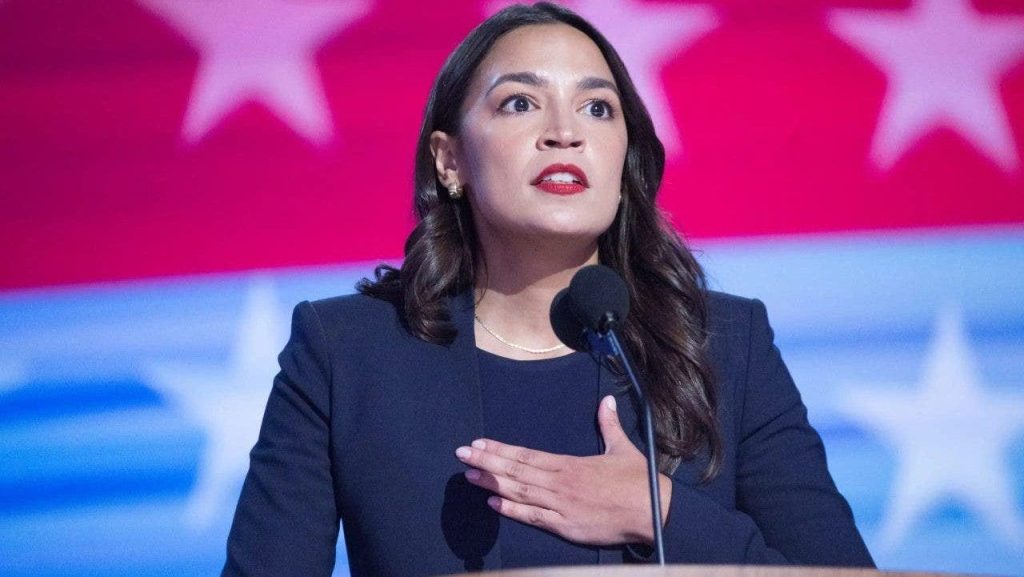Rep. Alexandria Ocasio-Cortez criticized the Democratic National Convention (DNC) for failing to center Palestinians in their response to the Israel-Hamas conflict, following her own speech at the event in Chicago. Ocasio-Cortez urged the party to affirm the “shared humanity” of both sides of the conflict, referencing the 40,000 Palestinians killed under Israeli bombardment. She emphasized the importance of acknowledging the Palestinian perspective to avoid participating in their dehumanization. The Biden administration and Democratic Party have been facing criticism from the left for their continued support of Israel in its conflict with Hamas.
Demonstrations against the Biden administration’s handling of the Middle East conflict and its support of Israel have been ongoing near the DNC in Chicago, with protesters demanding an end to U.S. aid to Israel and calling for Palestinian freedom. Thousands of protesters, including many wearing keffiyehs, gathered near the United Center arena where the DNC was taking place, displaying banners and chanting slogans against the administration’s policies. Chicago police confirmed that 56 protesters were arrested after clashes with law enforcement, with charges ranging from disorderly conduct to criminal damage to property.
Ocasio-Cortez’s comments came in response to criticism from author Ta-Nehisi Coates, who pointed out the absence of Palestinian voices at the convention. The congresswoman called for a shift in the party’s approach and a reevaluation of their response to the ongoing conflict. The DNC faced pressure to address the concerns of the growing left-wing contingent within the party that is dissatisfied with U.S. support for Israel. The protests near the convention site highlighted the deep divisions within the Democratic Party over the Israel-Hamas conflict and the broader issue of U.S. foreign policy in the region.
Anti-Israel demonstrations continued for a third consecutive night as the DNC proceedings unfolded at the United Center in Chicago. Protesters gathered in larger numbers compared to previous nights, marching down the streets waving flags and banners condemning U.S. aid to Israel and calling for an end to the conflict. The confrontations between protesters and law enforcement resulted in several arrests, with charges ranging from resisting an officer to disorderly conduct. The protests underscored the deep-rooted anger and frustration among many Americans over the U.S. government’s support of Israel in its conflict with Hamas.
The ongoing protests near the DNC highlighted the challenges facing the Democratic Party in managing internal divisions over foreign policy issues. Ocasio-Cortez’s call for centering Palestinians in the party’s response to the Israel-Hamas conflict reflected a broader sentiment within the party’s progressive wing, which seeks a more balanced approach to the Middle East conflict. The protests and arrests in Chicago underscored the intensity of the debate over U.S. support for Israel and the need for the party to address the concerns of its diverse base. The tensions between supporters of Israel and critics of the country’s policies have created a complex political landscape for the Democratic Party to navigate.
Overall, Rep. Alexandria Ocasio-Cortez’s criticism of the DNC’s response to the Israel-Hamas conflict, the ongoing protests near the convention site, and the arrests of demonstrators highlighted the deep divisions within the Democratic Party over foreign policy issues. The clash between the party’s progressive wing and more centrist elements over U.S. support for Israel underscored the challenges facing Democrats in addressing the concerns of their diverse base. The protests and arrests in Chicago reflect the broader debate over U.S. foreign policy in the Middle East and the need for a more nuanced approach to complex geopolitical conflicts. As the party grapples with internal divisions, it will be crucial for Democratic leaders to listen to the voices of all their constituents and work towards a more inclusive and balanced foreign policy agenda.


